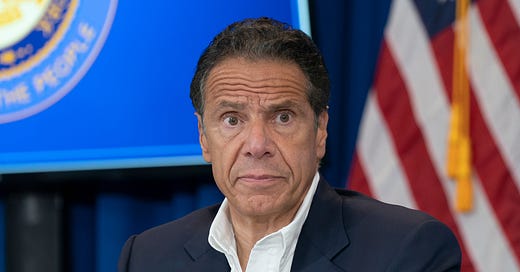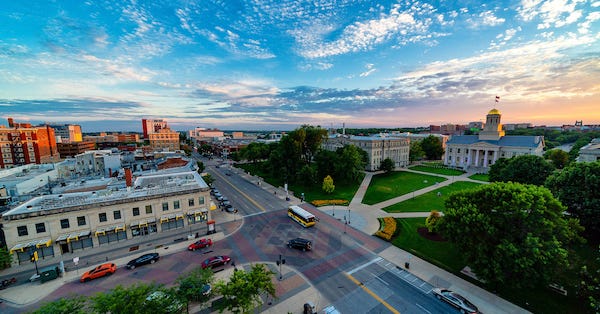E-Pluribus | August 16, 2021
A counterintuitive look at the Cuomo scandal, restoring the definition of competence, and what is Amazon's standard for censorship anyway?
A round up of the latest and best writing and musings on the rise of illiberalism in the public discourse:
Michael Tracey: What The Media Hasn’t Told You About The Cuomo Debacle
It might be easier to find defenders of exiled Afghanistan president Ashraf Ghani these days than soon-to-be-ex-governor Andrew Cuomo of New York, but Michael Tracey used his Substack last week not so much to defend Cuomo as question the media coverage of the events surrounding the allegations against him. While the criticism of Cuomo has been largely bi-partisan, Tracey argues that the near-universal condemnation of a politician is still no excuse for some of the corners that he alleges have been cut in pursuit of the truth.
For the time being, try to forget the name “Cuomo.” Try to imagine what your reaction would be if the following happened in the abstract:
A politician running for elected office decides to launch a series of conspicuously vague “harassment” accusations on Twitter, but rather than critically scrutinizing the political motivations which may have given rise to such a tactic, the politician is portrayed merely as a generic “accuser” who just benignly materialized out of thin air.
That politician then communicates (and, seemingly, coordinates) with another “accuser,” whose central accusation is that she was “groomed” not as a helpless child, but as an adult political operative in her mid 20s. Nonetheless, this second “accusation” gives the impression that “accusers” were beginning to snowball, and “where there’s smoke, there’s fire,” etc. The new “accuser” also happens to be a professional activist. (SEE BELOW FOR MORE…)
Soon thereafter, yet another “accuser” emerges, furthering the impression that a critical mass has been reached. But something’s odd. This new accuser’s accusation is that a photo she’d proudly displayed in her own office for years was retroactive evidence of abusive conduct.
These individuals’ accusations were sufficient to create such a condemnatory climate that the accused acceded to an “independent” investigation of himself, overseen by the state’s chief law enforcement official.
The state’s chief law enforcement official, announcing her findings, accuses the subject of the investigation of violating multiple state and federal laws, but — in a move that upends every previously-existing assumption about due process — then announces she will take no commensurate prosecutorial action, thus providing no venue for any formal cross-examination or rebuttal. Though operating under the auspices of law, she instead is content to just declare that the law had been violated, and issue a kind of newly-invented political indictment.
Read it all here.
Rosa Brooks: Competence Is Critical for Democracy. Let’s Redefine It.
Expertise has suffered some high profile hits in recent years, and the politicization of so many issues is certainly a factor. In The New York Times, Rosa Brooks argues that this undermining of the very idea of competence is bad for democracy.
A shared notion of competence is essential to democracy. If we want to save “competence” from being tossed into history’s dustbin, we need to understand why many Americans mistrust claims of competence. And to build back public confidence in competence, we need to understand the term in its broadest and most robust sense, encompassing not only skill and efficacy, but also judgment, humility and empathy.
On the right, the attack on competence arises in part out of deep-rooted populist and nationalist mistrust of “elites,” “globalists” and “cosmopolitans,” who are viewed as cynically selling out ordinary (read: white and rural) Americans in exchange for profit. Such views often translate into a broad right-wing suspicion of all claims of competence, knowledge and experience. For instance: Scientists say there’s evidence of catastrophic, human-caused global warming? Those overeducated products of elite liberal universities just want to take jobs away from hard-working Americans by destroying the fossil fuel industry.
On the left, some progressives are often equally suspicious of claims of competence, knowledge and expertise, which they tend to see as thinly disguised efforts to maintain unjust existing power structures (“privilege”) that devalue or exclude people of color, women, immigrants and the poor. The mildest version of this is a mistrust of “merit”: Don’t standardized tests such as the SAT merely operate to keep disadvantaged children out of elite colleges, for example, even as they purport to be neutral measures of knowledge and skills?
Read it all at The Times.
Wesley J. Smith: Amazon Bans Transgender Critics but Sells Suicide-by-Starvation Book
When Amazon infamously removed Ryan Anderson’s book When Harry Became Sally: Responding to the Transgender Moment and suspended an ad campaign for Abigail Shier’s book Irreversible Damage: The Transgender Craze Seducing our Daughters, the company and its employees argued it was protecting the transgender community. Then, Wesley Smith asks, how do how-to books on suicide protect anyone? What exactly is Amazon’s standard for censorship?
Amazon claims to protect transgender people from harm, don’t you know. Yet it has no problem selling several books that teach people how to commit suicide, including a new book that teaches readers how to starve themselves to death, known in euthanasia lexicon as VSED (voluntary stop eating and drinking)…
[…]
But I digress. The book-selling ethics of Amazon’s management are truly twisted. The company readily offers books that intend to teach how to commit — and will result in — suicides. At the same time, it bans books that simply engage in a respectful debate about a radical agenda — about which, surely, reasonable people can differ — because that could wound people’s feelings. Disgraceful.
Read it all.
Around Twitter:
Thread from Thomas Chatterton Williams on having the proper perspective on issues in American society:





Additional perspective from Peter Boghossian:

Via the Foundation Against Intolerance & Racism (FAIR), some research on social media’s impact political radicalization":





And finally, a collision of public health mandates, academic freedom and free speech at the University of Iowa:










